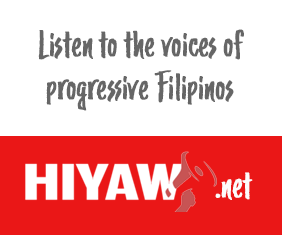Reposted from: http://nccphilippines.org/blog/2017/04/28/philippine-upr-watch-climate-of-impunity-getting-worse-in-ph/
On May 8, 2017, the Philippines will undergo the 3rd Cycle of Universal Periodic Review (UPR) of the United Nations Human Rights Council (UNHRC). The UPR is a mechanism under the UNHRC where member states’ fulfilment of its obligations to international rights treaties will be assessed by their peers and make recommendations. This process started in 2008 and the National Council of Churches in the Philippines (NCCP) and Karapatan, along with other members of the Ecumenical Voice for Human Rights and Peace in the Philippines (Ecu Voice), have convened the Philippine UPR Watch and formed a delegation to Geneva, Switzerland, to engage in the process. Since then, the network has submitted timely reports to the Council and for this 3rd Cycle, the 24 member organizations have submitted 15 individual stakeholder’s report and 3 joint reports.
The submissions show that following the first (2008) and second (2012) Universal Period Reviews on the Philippines and despite the commitment by the Philippine government to implement recommendations put forward by other countries (in 2008 the Philippine government agreed to 12 out of 17 recommendations, in 2012 the Philippine government agreed to implement 63 out of the 88 recommendations), many of these recommendations have not been implemented fully and there has been little change in the overall human rights situation in the Philippines. The submissions highlight different types of human rights violations that have occurred after the second UPR under the government of then President Benigo Simeon C. Aquino III and the first few months of the term of current President Rodrigo Roa Duterte.
For the Philippine UPR Watch, there has been no significant change in the human rights situation in the country and the climate of impunity has worsened.
Under President Benigno Aquino III for the period January 2012 to June 2016, there were 249 extra-judicial killings, 501 cases of frustrated extrajudicial killings, 17 victims of enforced disappearance, 144 cases of torture, 8 cases of rape, 891 illegal arrests, and 191,029 cases of threats/harassments/intimidation and numerous other cases involving communities and thousands of individuals as documented by the human rights group Karapatan.
Since President Duterte has assumed office, extrajudicial killings under the pretext of the war on drugs hogged the headlines in the past few months. Thousands were killed without due process, mostly from urban poor communities. While the killings attributed to the war on drugs have continued to gain media mileage, violations that are political in nature continue unabated. There are no specific measures on the part of government to actively protect the rights of human rights defenders. The latter continue to be subject to threat and intimidation, surveillance, trumped up charges, red-tagging, enforced disappearances, and extra-judicial killing. The human rights group Karapatan has documented 47 cases of extra-judicial killings under the Duterte administration that are politically motivated and involving mostly human rights defenders.
In communities, especially in the rural areas, militarization continues in the light of the Duterte administration’s version of counter-insurgency program, Oplan Kapayapaan. Military forces of the government continue to mass up in Mindanao. Communities suspected of supporting rebel groups have been targeted for aerial bombings displacing thousands of civilians.
With the killing of Lumad leaders and farmers and the displacement of their communities by the military and the paramilitary groups under the Aquino government up to the spate of killings in the Anti-Drug Campaign of the current President, Rodrigo Duterte display the brazenness of human rights violations being carried out in the Philippines and the climate of impunity that persists.
The failure to apprehend and prosecute the perpetrators of killings and human rights violations during the administrations of Presidents Arroyo and Aquino has greatly contributed to the worsening climate of impunity in the country. It can be said this accentuated the brazenness and impunity under the present government of President Duterte.
There is no improvement in the sphere of Economic, Social and Cultural Rights as well. Education, housing and health remain to be inaccessible. The recent much publicized action of an urban poor organization KADAMAY exposed the anemic housing program of the government. The action of the farmers of Hacienda Luisita also shows that landlessness continues to be a stark reality. Significant number of workers are still facing contractualization, low wages and forced migration. President Duterte has not made a significant difference compared to the previous administration in the context of socio-economic rights concerns.
A ray of hope that can impact on the human rights situation in the country is the peace negotiations between the Government of the Republic of the Philippines (GRP) and the National Democratic Front of the Philippines (NDFP). If both parties, especially the government, follow the Comprehensive Agreement on Respect for Human Rights and International Humanitarian Law (CARHRIHL), there is bound to be a marked improvement of the situation on the ground. The recent round of formal talks ended with a positive note with both parties agreeing that the principle of free distribution of land to farmers and peasants would uphold social, economic and cultural rights. There is also the possibility of a joint ceasefire. The international community can help by monitoring the process closely and calling both sides to respect and honor obligations arising from the negotiating table.
The Philippine UPR Watch has brought these concerns to the UN Human Rights Council through our reports and on May 8, the 10-member delegation composed of rights defenders and sectoral representatives from peoples’ organizations, churches and institutions, some of whom have also been subjected to rights violations in the past, will highlight these concerns before the UNHRC. The task now is to keep watch. To see to it that the Philippines adheres to its commitments to international human rights instruments.



